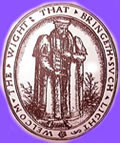CHAPTER THE SECOND
l'ome arme doit en douter...
The pirate Philippe-Raymond de Machon had been harassing trade on the Charente throughout the preceding autumn, before resting up at Montignac. News of Bedford, and the rich baggage train accompanying the English nobles, came from a fellow adventurer, the self-styled 'Lord' Colin Macdonald, who had made his base in nearby Neuvicq.
De Machon had recently returned to France after three years in the service of the Despot Konstantinos Palaeologos. From his lair in Glarentza (modern Killini) in the Morea he savaged Turkish and Venetian shipping alike from 1429 to 1431, so that the straights between the Ionian islands were eschewed by Sultan Murad II's navy and all but the heaviest-armed Venetian vessels. Finally expelled from Byzantine territory by decree of the Emperor Johanes VIII Palaeologos, he sailed for Barcelona via Messina, and visited associates in Toulouse before briefly availing himself of the hospitality of the powerful Lusignan family in the town of Vivonne. Rather then returning to his old haunts in Brittany, whose citizens he had so thoroughly terrorised in his youth, he first established a base on the unprotected Fouras peninsula, later moving up the river to Montignac, another town with Lusignan connexions.
As for Macdonald, a great deal is known about this disreputable scion of the Islay clan. One of the first graduates of the University of St Andrews, founded by Bishop Kennedy in 1411, he soon renounced any vocation he may have had as a cleric and moved to the North of England, where he held the post of librarian to Henry Percy, Second Earl of Northumberland, in the early 1420s. We know from records of their wedding presents that he was important enough to attend the marriage of James I of Scotland to Lady Margaret Beaufort, which took place in Southwark in 1423. A talented linguist, he acquired great knowledge and powerful friends, including the astrologer Richard Bolingbroke, but it seems that his penchant for the Black Arts attracted the disapproving attention of his employers and he was obliged to flee British shores for Flanders. He lived, apparently uneventfully, in Saint-Omer for several years as a dealer in manuscripts and translator of classical languages (and, it has been suggested, French spy). In his last years he travelled widely, settling briefly in Mainz, where he may have had dealings with the lawyer and associate of Gutenberg, Johann Fust.
We do not know what took him to South West France, though by the beginning of the 1430s he had acquired sufficient wealth to build or purchase a small castle in Neuvicq (near Jarnac), then known as 'Château Lecoq' from the cockatrice (displayed, sable on a field or) on his coat-of-arms. In early 1432 he formed an unholy alliance with de Machon, whom he may have known for some years (both were in the southern counties of England in 1424-5).
The two became the scourge of the Gascon wine trade: an easy target for the battle-hardened robbers and ne'er-do-wells they gathered about them, notably the notorious Irishman 'Wild Jack' Conwye (believed by some to have been none other than 'Jack Cade', leader of the Kentish rebellion of 1450), Paulus Justinius van Nagel (a cynical mercenary and tactical genius from Bruges who had fought with Bedford at Verneuil and at the Siege of Rouen), Macdonald's feckless cousin Ewan 'Don Juanito' Maclean, and a heartless Yorkshire cut-throat and hell-raiser, hideously disfigured from birth and known from the Elbe to the Tagus as 'The Horned One' or - ironically - as David 'the Noble'.
 |



